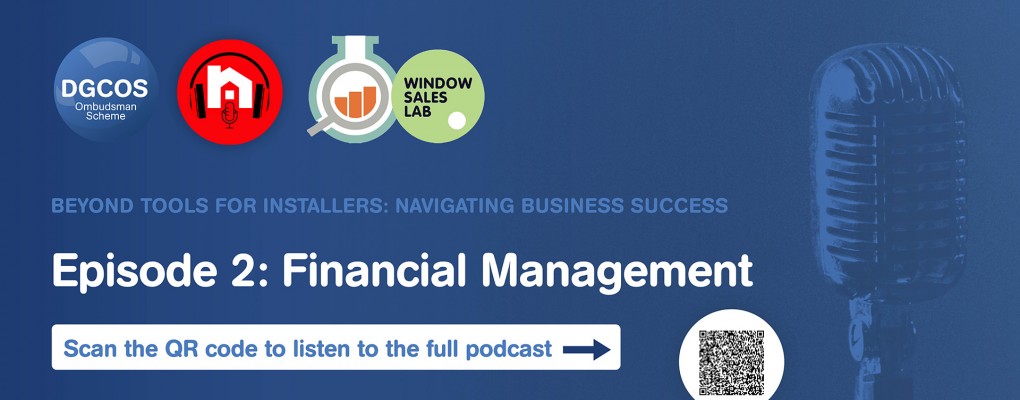For the Financial Management Podcast (part of the Beyond Tools: Navigating Business Success series), host Anna Scothern (National Home Improvement Council Chair) is joined by Faisal Hussain (Chief Executive DGCOS) and Paul Clifton (Sales & Profit Consultant with Window Sales Lab) to delve into effective financial management strategies. They provide practical insights into managing business finances, drawing from their extensive experience to offer clarity on some of the financial complexities business owners often find confusing.
Mastering financial management is essential for achieving sustainable profitability and success in any business. By understanding critical financial metrics and leveraging innovative tools, business owners can navigate their finances more effectively. Paul Clifton, Sales & Profit Consultant with Window Sales Lab, and Faisal Hussain, Chief Executive DGCOS, guide us through the necessary steps to maintain financial health and achieve long-term success in the window, door and conservatory industry.
Understanding numbers
Understanding your starting financial position and key metrics is fundamental, and Paul focuses on three crucial areas: quantification, orchestration, and innovation. To avoid cash flow problems, businesses should always keep at least one month's revenue in the bank. Grasping cost and revenue percentages is vital; without this knowledge, businesses are vulnerable to market fluctuations. Paul collaborates with bookkeepers to categorise costs, including marketing, admin, sales, materials, vehicles, and repairs, setting clear financial benchmarks, and highlighting areas for improvement.
Supporting installers with practical advice
Faisal points out that many business owners struggle with their financial figures, “often confusing gross profit and net profit, leading to mismanagement.” To address this, DGCOS provides support through templates, spreadsheets, and check-ins, helping installers maintain a clear financial overview.
Adhering to profit margins and avoiding price competition is crucial. Long-term costs, such as warranty visits, must be factored into profitability calculations. Faisal also stresses the importance of not underestimating VAT and HMRC payments, advising businesses to allocate funds monthly to avoid end-of-quarter surprises. Regular financial reviews can identify overlooked expenses, ensuring comprehensive financial health.
A game-changing tool
Paul introduces his profit tracker spreadsheet, a tool designed to empower business owners by linking current costs with key sales performance indicators. Paul explains to listeners that this tool allows users to adjust metrics and immediately see the impact on their financial picture, "Identifying low-hanging fruit enables businesses to make simple tweaks to improve profitability".
For instance, involving more decision-makers during quotes or adjusting prices slightly can lead to substantial profit increases. One company improved conversion rates and monthly profits by changing its approach. Even minor price increases, such as 3%, can enhance markup without affecting conversion rates.
The five steps to sales success
Achieving sales success involves five key steps: fact-finding, design options, specification, price options, and closing the sale. Paul emphasises that separating each step improves outcomes, ultimately leading to higher conversion rates, "This structured approach ensures salespeople address customer needs effectively, increasing sales and profitability”.
By breaking down the sales process into distinct steps, businesses can provide a more thorough and personalised approach. So, by understanding customer needs and preferences, presenting design options, detailing product specifications, transparent price discussions, and a smooth closing process can lead to successful sales outcomes.
Partnering up
Faisal highlights that DGCOS invests substantial effort in finding reputable associates in bookkeeping, recruitment, and marketing to recommend to their members. Building strong relationships and support networks is vital and essentially these associates become extensions of their members' businesses, providing specialist advice and support. Relying on these relationships allows business owners to focus on growth and profitability.
Specialised services such as, bookkeeping, which maintains accurate financial records, expert marketing advice, which enhances visibility and attracts new customers, and recruitment support, which ensures that businesses hire the right talent, contributes to overall efficiency and growth.
Coaching: Path to sustainability
Achieving sustainable growth requires a structured approach. Paul offers financial health checks and a three-stage plan typically taking about three years. This involves improving conversion rates, managing costs, and implementing necessary changes. Willingness to change and commitment to learning new skills are crucial. "By working with a coach, businesses can achieve their profit goals and create a system that produces extraordinary results”.
Regular reviews of monthly figures and close collaboration with sales teams to enhance conversion rates and optimise costs are integral to Paul’s mentoring approach. This ensures sustainable growth, keeping businesses competitive and profitable long-term.
Next steps
Financial management isn't just about keeping the books, it's about understanding the bigger picture and the impact of decisions on your business. It starts by looking at the numbers and being honest about your financial situation. Track business progress, make informed decisions, and seek support from experts. By working on your business, rather than just in it, you can achieve long-term success and profitability. With the right tools and strategies, any business can thrive.
Listen to the full episode: https://nhic.podbean.com/e/the-profitpercentfinancialmanagementadvice-for-thehomeimprovement-sector%e2%80%93-part-ofthe-beyondtools-navigating-business-successspecial-seriesof-t/

